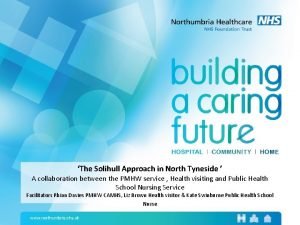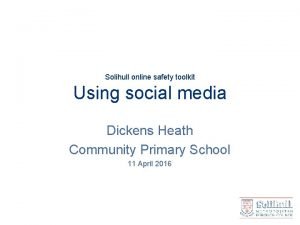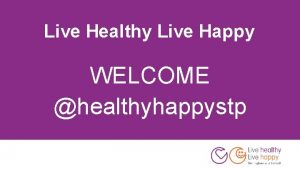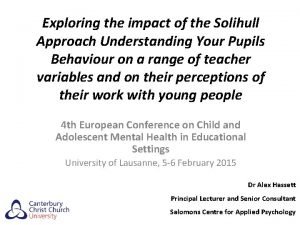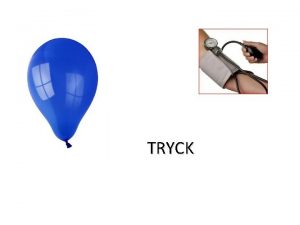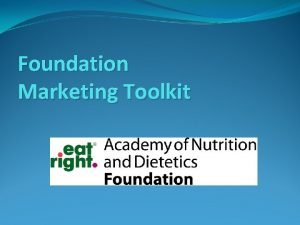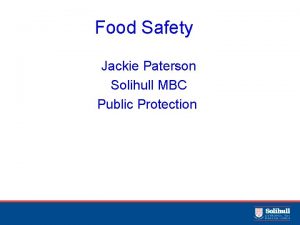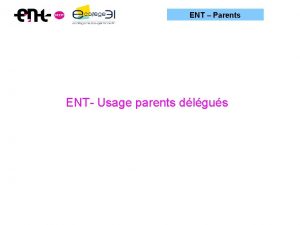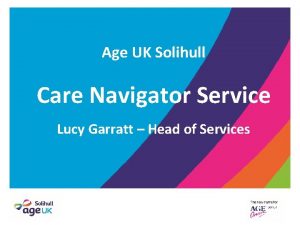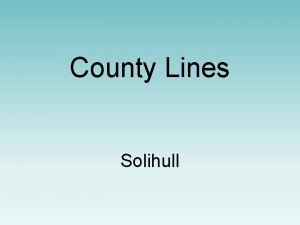Solihull online safety toolkit Online safety for parents


























- Slides: 26

Solihull online safety toolkit Online safety for parents and carers School name Date Presenter’s name Presenter’s email address

What is online safety? ‘ The term ‘online safety’ reflects a widening range of issues associated with technology and a user’s access to content, contact with others and behavioural issues ’ Online safety is not just about technology It is also about safeguarding It is also about behaviour

The world is changing

What is changing for children? One in four children under eight owns a tablet 23% of children are seen on the internet before they’re born 74% of eight- to 11 -year olds have access to a tablet at home 63% of children have a smartphone before they start secondary school One in 10 children has a mobile phone before they’re five

What is changing for children? Health-related behaviour questionnaire in Solihull Year 2 78% use the internet for playing games 36% go on internet when parents not in 8% chat to people online room that they’ve never met 67% have been told how to stay safe if chatting online 62% say that their 12% use Facebook or Bebo parents/carers have rules for use

What is changing for children? Health-related behaviour questionnaire in Solihull Year 4 and year 6 70% use the internet for 75% go on internet when parents not in room playing games 15% chat to people online 3% have had received a that they’ve never met chat message that scared or upset them 91% have been told how to stay safe if chatting online 76% say that their parents/carers 82% watching You. Tube, have rules for use Netflix, Amazon Prime…

The benefits learn find help have fun connect discover create

Online safety in school

Keeping children safe in education Protecting children from § § § § Abuse Physical abuse Emotional abuse Sexual abuse Neglect bullying including cyberbullying children missing education child missing from home or care child sexual exploitation (CSE) domestic violence drugs fabricated or induced illness faith abuse female genital mutilation (FGM) forced marriage gangs and youth violence Keeping children safe in education Deportment for Education, September 2016 § gender-based violence/violence against women and girls (VAWG)13 § hate § mental health § missing children and adults § private fostering § preventing radicalisation – and Annex A § relationship abuse § sexting § trafficking ‘it is essential that children are safeguarded from potentially harmful and inappropriate online material. As such, governing bodies and proprietors should ensure appropriate filters and appropriate monitoring systems are in place. ’

Effectiveness of safeguarding arrangements ‘ ‘ ‘ Children and learners are protected and feel safe. ’ Children and learners are protected and helped to keep themselves safe from bullying, homophobic behaviour, racism, sexism and other forms of ’ discrimination. Staff and other adults working within the setting are clear about procedures where they are concerned about the safety of a child or learner. There is a named and designated lead who is enabled to play an effective role in pursuing concerns and protecting children and learners. Inspecting safeguarding in early years, education and skills settings Ofsted, September 2016 ’

Effectiveness of safeguarding arrangements All areas of school are considered § § § Pupils Staff Wider school community Governors Parents and carers

Online safety outside school

What are the issues outside school? gaming tablets social media/networking mobile phones content contact

Social media/networking

Online safety advice – NSPCC Net Aware https: //www. net-aware. org. uk/

Social media/networking Make it age-appropriate Be you child’s ‘friend’ Check for more help – regularly Check links to games Restrict privacy settings

Gaming - PEGI

Gaming - online Make it age-appropriate Find out how you can report problems Don’t share information Take care with headsets Consider ‘real’ friends only Use a nickname Consider age-locks if possible

Phones Unsupervised internet access? Risk of loss or theft? Think about content Text messaging control (including images) Do you want to share your location? Image sharing?

Tablets Think about setting up controls Think about video calls and privacy Find out how you can report problems Think about restricting purchases – especially in-app purchases Think about wi-fi issues, privacy and parenting

Tablets Parental controls (i. Pad as an example) https: //www. nspcc. org. uk/preventing-abuse/keeping-children-safe/online-safety

What to do if (when? ) something goes wrong Before it happens § Make sure your child trusts you and knows to tell you § Make sure your child knows to leave it - evidence § Never threaten ‘no more internet’ The worst things happen very rarely Other (less bad) things happen more frequently § Deliberate or accidental? § malevolent or thoughtless? § Victim or perpetrator?

What to do if (when? ) something goes wrong When it happens § Reassure your child § Listen to them about what they’ve seen § Look at what they’ve seen – with them? Without them? § Think about nature of incident § Think about who you might talk to § § School Service provider NSPCC or other support Police/CEOP (101 or 999)

Think about boundaries and rules Think about your own behaviour Think about time restrictions Think about ‘manners’ Think about sharing rules with other Think about parents buying ‘rules’

Think about your digital footprint Ask yourself 1. What do I look like? 2. Would I want this shared about me? 3. Am I giving away too much? 4. Would it pass the ‘front page test’? 5. Is it a footprint or a tattoo?

Questions?
 Frida kahlo mes grands parents mes parents et moi analyse
Frida kahlo mes grands parents mes parents et moi analyse Parents parents
Parents parents Frida kahlo mes grands parents mes parents et moi analyse
Frida kahlo mes grands parents mes parents et moi analyse Anisa ali
Anisa ali Solihull approach triangle
Solihull approach triangle Solihull approach triangle
Solihull approach triangle Social media solihull
Social media solihull Birmingham and solihull stp
Birmingham and solihull stp Solihull approach triangle
Solihull approach triangle Solihull ap academy
Solihull ap academy Kontinuitetshantering
Kontinuitetshantering Typiska drag för en novell
Typiska drag för en novell Tack för att ni lyssnade bild
Tack för att ni lyssnade bild Vad står k.r.å.k.a.n för
Vad står k.r.å.k.a.n för Shingelfrisyren
Shingelfrisyren En lathund för arbete med kontinuitetshantering
En lathund för arbete med kontinuitetshantering Underlag för särskild löneskatt på pensionskostnader
Underlag för särskild löneskatt på pensionskostnader Personlig tidbok
Personlig tidbok Anatomi organ reproduksi
Anatomi organ reproduksi Förklara densitet för barn
Förklara densitet för barn Datorkunskap för nybörjare
Datorkunskap för nybörjare Tack för att ni lyssnade bild
Tack för att ni lyssnade bild Debattartikel mall
Debattartikel mall Magnetsjukhus
Magnetsjukhus Nyckelkompetenser för livslångt lärande
Nyckelkompetenser för livslångt lärande Påbyggnader för flakfordon
Påbyggnader för flakfordon Formel för lufttryck
Formel för lufttryck





